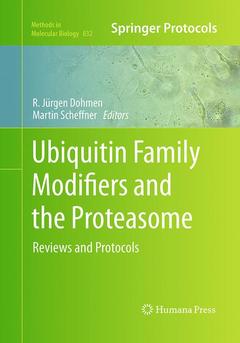Description
Ubiquitin Family Modifiers and the Proteasome, Softcover reprint of the original 1st ed. 2012
Reviews and Protocols
Methods in Molecular Biology Series, Vol. 832
Language: English
Subject for Ubiquitin Family Modifiers and the Proteasome:
Support: Print on demand
666 p. · 17.8x25.4 cm · Paperback
Description
/li>Contents
/li>Comment
/li>
The ubiquitin-proteasome system (UPS) and ubiquitin-related modifiers are not only involved in cellular protein quality control but also in the regulation of many fundamental cellular processes/pathways as well as in their disease-relevant aberrations. Ubiquitin Family Modifiers and Proteasome: Reviews and Protocols presents both novel developments in UPS research and important methods related to the main recent advances in the field of ubiquitin family modifiers. Divided into five convenient sections, this volume focuses on the enzymology and substrate identification of ubiquitin family modifiers, the recognition and chain formation of these modifiers, the analysis of proteasome biogenesis and function, protein quality control, and finally the use of small molecules and strategies to study or manipulate the function of the UPS and of ubiquitin family modifiers, respectively. Written in the highly successful Methods in Molecular Biology? series format, chapters include introductions to their respective topics, lists of the necessary materials and reagents, step-by-step, readily reproducible protocols, and notes on troubleshooting and avoiding known pitfalls.
Authoritative and easily accessible, Ubiquitin Family Modifiers and Proteasome: Reviews and Protocols will be of great use to investigators and students engaged in both basic and applied research in life sciences.
Three Decades of Studies to Understand the Functions of the Ubiquitin Family.- Structure and Evolution of Ubiquitin and Ubiquitin-Related Domains.- Deciphering Tissue-Specific Ubiquitylation by Mass Spectrometry.- Analysis of Cellular SUMO and SUMO-Ubiquitin Hybrid Conjugates.- Recombinant Reconstitution of Sumoylation Reactions In vitro.- Reconstitution of SUMO-Dependent Ubiquitylation In vitro.- Detection and Analysis of FAT10 Modification.- Isolation of NEDDylated Proteins in Human Cells.- The ISG15 Conjugation System.- Pupylation: Proteasomal Targeting by a Protein Modifier in Bacteria.- Role of UbF Family Modifiers and their Binding Proteins in Cell Signaling.- Isolation of Ubiquitylated Proteins using Tandem Ubiquitin-Binding Entities (TUBEs).- Using Linkage-Specific Monoclonal Antibodies to Analyze Cellular Ubiquitination.- Measuring Rates of Ubiquitin Chain Formation as a Functional Readout of Ligase Activity.- Synthesis and Analysis of K11-Linked Ubiquitin Chains.- Synthesis and Analysis of Linear Ubiquitin Chains.- Detection and Quantitation of SUMO Chains by Mass Spectrometry.- Bioinformatical Detection of Recognition Factors for Ubiquitin and SUMO.- Surface Plasmon Resonance to Measure Interactions of UbFs with Their Binding Partners.- Identifying and Studying Ubiquitin Receptors by NMR.- Exploring the Role of p97 and its UBX-Domain Cofactors Through Identification of Their Interacting Proteins.- Assembly and Function of the Proteasome.- Using Native Gel Electrophoresis and Phosphofluoroimaging to Analyse GFP-tagged Proteasomes.- Disulfide Engineering to Map Subunit Interactions in the Proteasome and Other Macromolecular Complexes.- Using DNA Damage Sensitivity Phenotypes to Characterize Mutations Affecting Proteasome Function.- Analysing Properties of Proteasome Inhibitors using Kkinetic and X-Ray Crystallographic Studies.- Immunoproteasome-Specific Inhibitors and Their Application.- Binding of Ubiquitin Conjugates to Proteasomes as Visualized with Native Gels.- Affinity Purification of Mmammalian 26S Proteasomes Using an Ubiquitin-Like Domain.- Using siRNA Techniques to Dissect Proteasome Assembly Pathways in Mammalian Cells.- Reconstitution of PA700, the 19S Regulatory Particle, from Purified Precursor Complexes.- Cellular Responses to Misfolded Proteins and Protein Aggregates.- Live-Cell Imaging of Ubiquitin-Proteasome System Function.- Analysis of Chaperone-assisted Ubiquitylation.- Use of CPY* and its Derivatives to Study Protein Quality Control in Various Cell Compartments.- Assays to Measure ER-Associated Degradation in Yeast.- SDS-PAGE Techniques to Study Ubiquitin-Like Conjugation Systems in Yeast Autophagy.- Analysis of Ubiquitin-Dependent Proteolysis in C. elegans.- Structural Insights into Functional Modes of Proteins Involved in Ubiquitin Family Pathways.- Identification and Application of NEDD8 E1 Inhibitors.- Formation of Ubiquitin Dimers via Azide Alkyne Click Reaction.- Synthesis of Atypical Diubiquitin Chains.- TIPI - TEV Protease-Mediated Induction of Protein Instability.- PROTAC-Induced Proteolytic Targeting.




